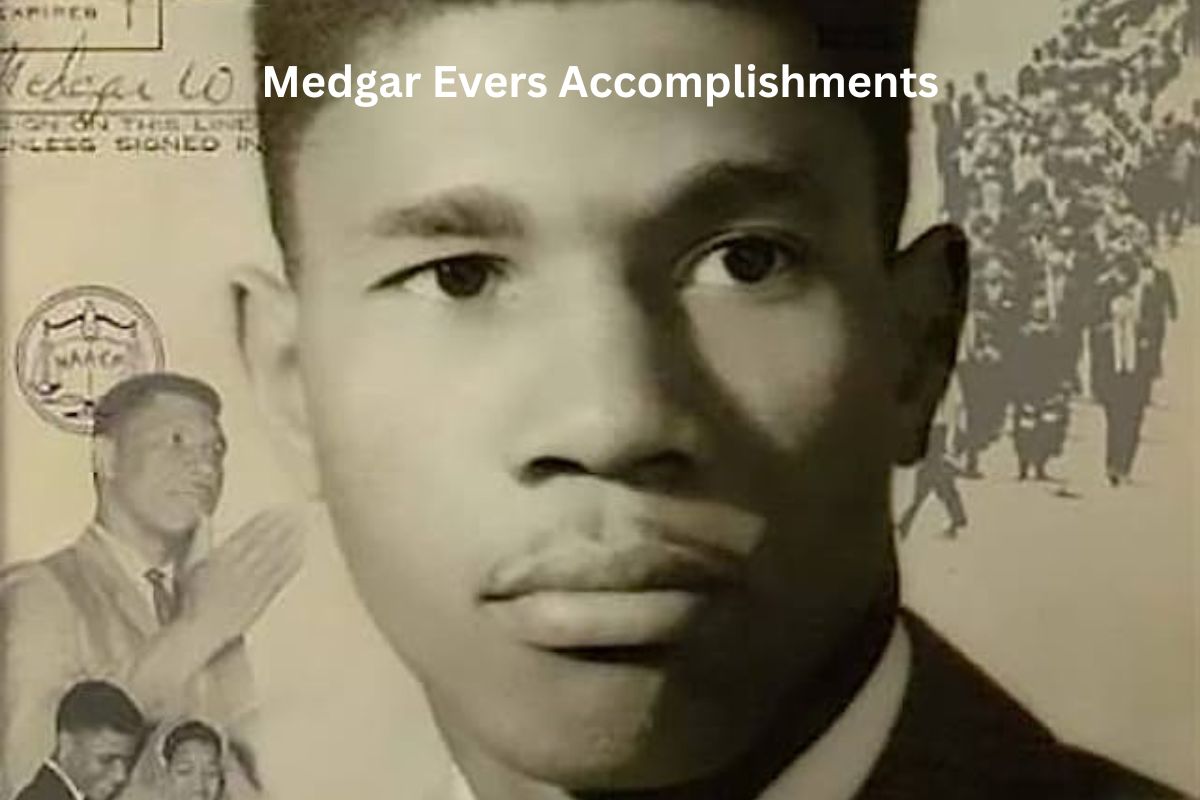Medgar Evers was a prominent civil rights activist and leader in the United States during the 1950s and 1960s. As the Mississippi field secretary for the NAACP, he dedicated his life to the pursuit of racial equality and social justice.
Evers made significant contributions through his activism, which included voter registration efforts, investigating civil rights violations, advocating for school desegregation, promoting economic empowerment, and inspiring youth activism.
He also played a crucial role in legal advocacy, organizing protests, delivering powerful civil rights speeches, and leaving behind an inspiring legacy through his martyrdom.
Medgar Evers’ work and sacrifice continue to serve as an enduring symbol of the ongoing struggle for equality and justice in America.
Accomplishments of Medgar Evers
1. NAACP Activism
Medgar Evers served as the Mississippi field secretary for the National Association for the Advancement of Colored People (NAACP).
In this role, he dedicated his efforts to advancing civil rights and combating racial discrimination.
Evers worked tirelessly to mobilize communities, raise awareness, and coordinate grassroots initiatives aimed at achieving racial equality.
2. Voter Registration Efforts
Recognizing the power of political participation, Evers focused on promoting African American voter registration in Mississippi.
During the era of Jim Crow laws and systemic voter suppression, Evers organized voter registration drives, educated people about their rights, and encouraged African Americans to exercise their right to vote.
Also Read: Medgar Evers Timeline
His efforts aimed to dismantle barriers that prevented African Americans from participating fully in the democratic process.
3. Investigating Civil Rights Violations
Evers played a critical role in documenting and exposing civil rights violations committed against African Americans. He collected evidence, interviewed witnesses, and meticulously documented instances of racial violence, harassment, and discrimination.
Also Read: Medgar Evers Facts
Evers aimed to shed light on these injustices, bringing attention to the plight of African Americans and urging legal action to hold perpetrators accountable. His investigations provided crucial evidence for legal cases and fueled public discourse on the need for civil rights reforms.
4. School Desegregation
Medgar Evers was a staunch advocate for the desegregation of schools in Mississippi. He recognized that segregated educational systems perpetuated inequality and denied African American children equal opportunities for quality education.
Evers worked to challenge the “separate but equal” doctrine by organizing protests, lobbying for policy changes, and supporting legal efforts to dismantle racially segregated schools.
His dedication to school desegregation aimed to ensure that all children had access to equal educational opportunities, regardless of their race.
5. Economic Empowerment
Evers understood the importance of economic empowerment in the fight against racial inequality. He recognized that economic disparities perpetuated social and political injustices.
Evers worked to promote economic opportunities for African Americans by advocating for fair employment practices, encouraging entrepreneurship, and supporting initiatives that aimed to uplift economically disadvantaged communities.
He believed that economic empowerment was a crucial aspect of achieving lasting social change and improving the quality of life for African Americans.
6. Youth Activism
Medgar Evers was a mentor and role model for young activists. He recognized the power and passion of youth in driving social change. Evers actively engaged with students, organized youth groups, and encouraged their involvement in the civil rights movement.
He believed in the importance of empowering the next generation to become agents of change and supported their participation in peaceful protests, demonstrations, and other forms of activism.
By inspiring and mobilizing young people, Evers helped to ensure the continued momentum of the civil rights movement and its longevity beyond his lifetime.
7. Legal Advocacy
Medgar Evers understood the power of the legal system in effecting change. He collaborated with lawyers and civil rights organizations to file lawsuits challenging discriminatory laws, policies, and practices.
Evers actively sought justice through legal means, aiming to dismantle the institutionalized racism and segregation that plagued Mississippi and the broader United States. His legal advocacy aimed to secure equal rights, fair treatment, and justice for African Americans.
8. Organizing Protests
Medgar Evers played a crucial role in organizing and leading protests as a means of raising awareness and pressuring authorities to address racial injustice.
He coordinated peaceful demonstrations, sit-ins, and boycotts to challenge segregation and discriminatory practices.
Evers understood the power of collective action and civil disobedience to effect change, often strategizing with other civil rights leaders to plan impactful protests that garnered media attention and public support.
9. Powerful Civil Rights Speeches
Medgar Evers possessed exceptional oratory skills and delivered powerful speeches that resonated with audiences. His speeches focused on the urgency of racial equality and justice, inspiring individuals to join the struggle for civil rights.
Evers used his platform to expose the realities of racial discrimination, advocate for equal rights, and call for unity and solidarity among all races.
His speeches helped galvanize support for the civil rights movement and generated broader awareness of the systemic injustices faced by African Americans.
10. Inspiring Legacy and Martyrdom
Medgar Evers’ lasting impact lies in the legacy he left behind and his tragic martyrdom. His unwavering commitment to the civil rights movement and his ultimate sacrifice made him a symbol of the fight against racial injustice.
Evers’ assassination in 1963 sent shockwaves through the nation, further igniting the civil rights movement and intensifying efforts to combat systemic racism.
His martyrdom elevated him to an iconic status, serving as a catalyst for change and inspiring countless individuals to continue the struggle for racial equality and social justice.
Evers’ legacy continues to resonate today, reminding us of the ongoing need to address systemic racism and work towards a more inclusive society.
